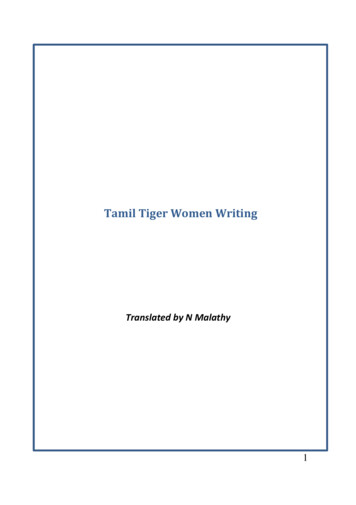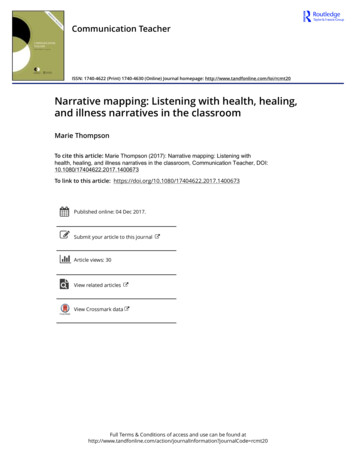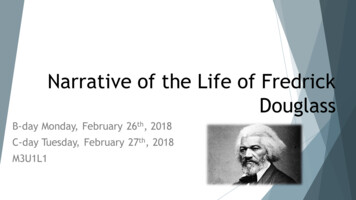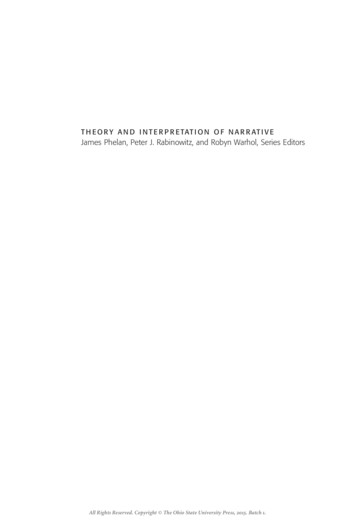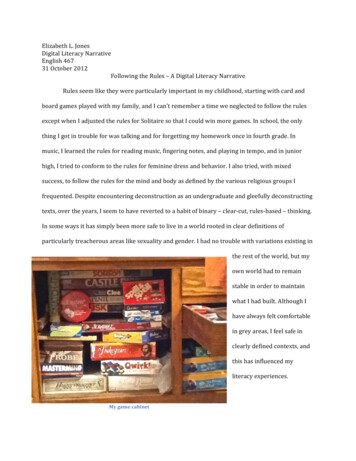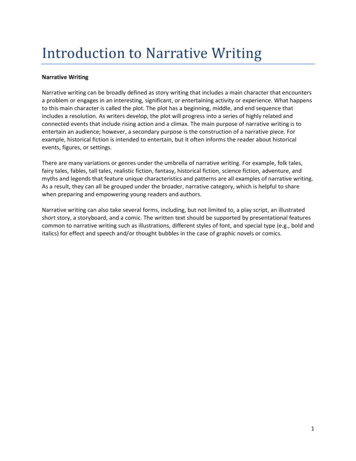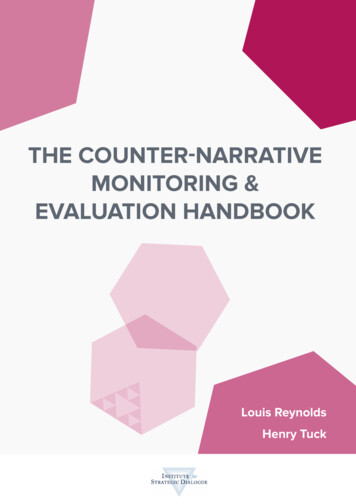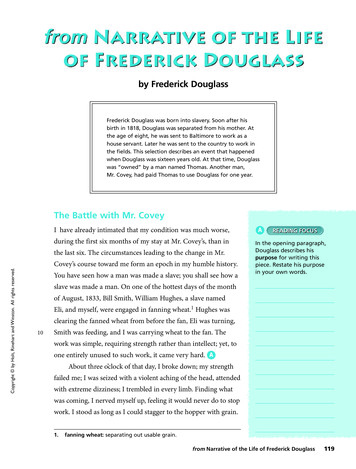
Transcription
from Narrative of the Lifeof Frederick Douglassby Frederick DouglassFrederick Douglass was born into slavery. Soon after hisbirth in 1818, Douglass was separated from his mother. Atthe age of eight, he was sent to Baltimore to work as ahouse servant. Later he was sent to the country to work inthe fields. This selection describes an event that happenedwhen Douglass was sixteen years old. At that time, Douglasswas “owned” by a man named Thomas. Another man,Mr. Covey, had paid Thomas to use Douglass for one year.The Battle with Mr. CoveyI have already intimated that my condition was much worse,during the first six months of my stay at Mr. Covey’s, than inthe last six. The circumstances leading to the change in Mr.Copyright by Holt, Rinehart and Winston. All rights reserved.Covey’s course toward me form an epoch in my humble history.You have seen how a man was made a slave; you shall see how aAREADING FOCUSIn the opening paragraph,Douglass describes hispurpose for writing thispiece. Restate his purposein your own words.slave was made a man. On one of the hottest days of the monthof August, 1833, Bill Smith, William Hughes, a slave namedEli, and myself, were engaged in fanning wheat.1 Hughes wasclearing the fanned wheat from before the fan, Eli was turning,10Smith was feeding, and I was carrying wheat to the fan. Thework was simple, requiring strength rather than intellect; yet, toone entirely unused to such work, it came very hard. AAbout three o’clock of that day, I broke down; my strengthfailed me; I was seized with a violent aching of the head, attendedwith extreme dizziness; I trembled in every limb. Finding whatwas coming, I nerved myself up, feeling it would never do to stopwork. I stood as long as I could stagger to the hopper with grain.1.fanning wheat: separating out usable grain.from Narrative of the Life of Frederick Douglass119
When I could stand no longer, I fell, and felt as if held down byA00VOCABULARYTXT LOZENGE2-LINESWord Study00treadingMarg SubHdAyard is an areaan immense weight. The fan of course stopped; everyone had his20own work to do; and no one could do the work of the other, andhave his own go on at the same time.wherehorses walk over00 Marg Txtwheat to separate the grainfrom the straw. The namecomes from the verb tread,which means “step on” or“walk over.” Use tread in asentence of your own.Mr. Covey was at the house, about one hundred yards fromthe treading yard where we were fanning. A On hearing the fanstop, he left immediately, and came to the spot where we were.He hastily inquired what the matter was. Bill answered that I wassick, and there was no one to bring wheat to the fan. I had by thistime crawled away under the side of the post-and-rail fence bywhich the yard was enclosed, hoping to find relief by getting outof the sun. He then asked where I was. He was told by one of the30hands. BHe came to the spot, and, after looking at me awhile, askedme what was the matter. I told him as well as I could, for I scarceBhad strength to speak. He then gave me a savage kick in the00 TXT LOZENGELANGUAGECOACHside, and told me to get up. I tried to do so, but fell back in the00Marg SubHdHandsis a word withmultiplemeanings, and does00 Marg Txtnot refer to body parts here.Whatdoes hands mean in00 Marg Txt WOLthis paragraph?attempt. He gave me another kick, and again told me to rise. Iagain tried, and succeeded in gaining my feet; but, stooping toget the tub with which I was feeding the fan, I again staggeredhickory slat with which Hughes had been striking off the half40bushel measure, and with it gave me a heavy blow upon the head,making a large wound, and the blood ran freely; and with thisagain told me to get up. I made no effort to comply, having nowCVOCABULARYmade up my mind to let him do his worst. In a short time afterSelection Vocabularyreceiving this blow, my head grew better. Mr. Covey had now leftUse context clues to guessthe definition of the wordcomply, and write it below.me to my fate. CAt this moment I resolved, for the first time, to go to mymaster, enter a complaint, and ask his protection. In order to [do]this, I must that afternoon walk seven miles; and this, under the00 TXT LOZENGE00 Marg Txtcircumstances, was truly a severe undertaking. I was exceedingly50feeble; made so as much by the kicks and blows which I received,as by the severe fit of sickness to which I had been subjected. I,however, watched my chance, while Covey was looking in anopposite direction, and started for St. Michael’s. I succeeded120from Narrative of the Life of Frederick DouglassCopyright by Holt, Rinehart and Winston. All rights reserved.and fell. While down in this situation, Mr. Covey took up the
in getting a considerable distance on my way to the woods,when Covey discovered me, and called after me to come back,threatening what he would do if I did not come. I disregardedboth his calls and his threats, and made my way to the woodsDCHECK00QUICKTXT LOZENGEWhydoes Douglass ignore00 Marg TxtCovey’s calls and threats?as fast as my feeble state would allow; and thinking I mightbe overhauled by him if I kept the road, I walked through the60woods, keeping far enough from the road to avoid detection, andnear enough to prevent losing my way. DI had not gone far before my little strength again failedme. I could go no farther. I fell down, and lay for a considerabletime. The blood was yet oozing from the wound on my head.For a time I thought I should bleed to death; and think now thatI should have done so, but that the blood so matted my hair asto stop the wound. After lying there about three quarters of anELITERARY ANALYSISWhat does Douglass meanwhen he says his appearancewould move anyone butsomeone with a “heart ofiron”?hour, I nerved myself up again, and started on my way, throughbogs and briers, barefooted and bareheaded, tearing my feet70sometimes at nearly every step; and after a journey of about00 TXT LOZENGE00 Marg Txtseven miles, occupying some five hours to perform it, I arrivedat master’s store. I then presented an appearance enough to affectany but a heart of iron. From the crown of my head to my feet,Copyright by Holt, Rinehart and Winston. All rights reserved.I was covered with blood. My hair was all clotted with dust andblood; my shirt was stiff with blood. My legs and feet were tornin sundry places with briers and thorns, and were also coveredwith blood. I suppose I looked like a man who had escaped a denof wild beasts, and barely escaped them. EIn this state I appeared before my master, humbly entreating80him to interpose his authority for my protection. I told him allFLITERARY FOCUSthe circumstances as well as I could, and it seemed, as I spoke,How would you describeDouglass’sdiction so far?00 TXT LOZENGEat times to affect him. He would then walk the floor, and seek00 Marg Txtto justify Covey by saying he expected I deserved it. He askedme what I wanted. I told him, to let me get a new home; that assure as I lived with Mr. Covey again, I should live with but to diewith him; that Covey would surely kill me; he was in a fair way forit. F Master Thomas ridiculed the idea that there was any dangerof Mr. Covey’s killing me, and said that he knew Mr. Covey; thathe was a good man, and that he could not think of taking mefrom Narrative of the Life of Frederick Douglass121
90Afrom him; that, should he do so, he would lose the whole year’swages; that I belonged to Mr. Covey for one year, and that I mustREADING FOCUSgo back to him, come what might; and that I must not troubleHow is Douglass expressinghis purpose for writing now?Do you find it effective? Whyor why not?him with any more stories, or that he would himself get hold ofme. After threatening me thus, he gave me a very large dose ofsalts, telling me that I might remain in St. Michael’s that night (itbeing quite late), but that I must be off back to Mr. Covey’s earlyin the morning; and that if I did not, he would get hold of me,which meant that he would whip me.I remained all night, and, according to his orders, I started100off to Covey’s in the morning (Saturday morning), wearied inbody and broken in spirit. I got no supper that night, or breakfast that morning. I reached Covey’s about nine o’clock; and justas I was getting over the fence that divided Mrs. Kemp’s fieldsfrom ours, out ran Covey with his cowskin, to give me anotherwhipping. Before he could reach me, I succeeded in getting tothe cornfield; and as the corn was very high, it afforded me themeans of hiding. He seemed very angry, and searched for me aQUICK CHECKlong time. My behavior was altogether unaccountable. He finallyWho is Sandy Jenkins?gave up the chase, thinking, I suppose, that I must come home110for something to eat; he would give himself no further trouble inlooking for me. I spent that day mostly in the woods, having thealternative before me—to go home and be whipped to death, orstay in the woods and be starved to death. AThat night, I fell in with Sandy Jenkins, a slave with whomI was somewhat acquainted. Sandy had a free wife who livedabout four miles from Mr. Covey’s; and it being Saturday, he wason his way to see her. I told him my circumstances, and he verykindly invited me to go home with him. B I went home withhim, and talked this whole matter over, and got his advice as to120what course it was best for me to pursue. I found Sandy an oldadvisor.2 He told me, with great solemnity, I must go back toCovey; but that before I went, I must go with him into anotherpart of the woods, where there was a certain root, which, if I2.122an old advisor: someone who can offer good advice.from Narrative of the Life of Frederick DouglassCopyright by Holt, Rinehart and Winston. All rights reserved.B
would take some of it with me, carrying it always on my rightside, would render it impossible for Mr. Covey, or any other whiteman, to whip me. He said he had carried it for years; and since hehad done so, he had never received a blow, and never expectedCQUICK CHECKWhat surprises Douglassabout Covey’s conduct?to while he carried it. I at first rejected the idea, that the simplecarrying of a root in my pocket would have any such effect as he130had said, and was not disposed to take it; but Sandy impressedthe necessity with much earnestness, telling me it could do noharm, if it did no good. To please him, I at length took the root,and, according to his direction, carried it upon my right side.This was Sunday morning.I immediately started for home; and upon entering the yardgate, out came Mr. Covey on his way to meeting. He spoke to mevery kindly, made me drive the pigs from a lot nearby, and passedon toward the church. Now, this singular conduct of Mr. Coveyreally made me begin to think that there was something in the140root which Sandy had given me; and had it been on any otherday than Sunday, I could have attributed the conduct to no othercause than the influence of that root; and as it was, I was halfinclined to think the root to be something more than I at firstCopyright by Holt, Rinehart and Winston. All rights reserved.had taken it to be. C All went well till Monday morning. Onthis morning, the virtue of the root was fully tested.Long before daylight, I was called to go and rub, curry, andfeed the horses. I obeyed, and was glad to obey. But while thusengaged, while in the act of throwing down some blades fromthe loft, Mr. Covey entered the stable with a long rope; and just150as I was half out of the loft, he caught hold of my legs, and wasabout tying me. As soon as I found what he was up to, I gavea sudden spring, and as I did so, he holding to my legs, I wasbrought sprawling on the stable floor. Mr. Covey seemed nowto think he had me, and could do what he pleased; but at thismoment—from whence came the spirit I don’t know—I resolvedto fight; and, suiting my action to the resolution, I seized Coveyhard by the throat; and as I did so, I rose. He held on to me, andI to him. My resistance was so entirely unexpected, that Coveyfrom Narrative of the Life of Frederick Douglass123
ALITERARY FOCUSseemed taken all aback. He trembled like a leaf. A This gave me160assurance, and I held him uneasy, causing the blood to run whereI touched him with the ends of my fingers. Mr. Covey soon calledout to Hughes for help. Hughes came, and, while Covey held me,attempted to tie my right hand. While he was in the act of doingso, I watched my chance, and gave him a heavy kick close underthe ribs. This kick fairly sickened Hughes, so that he left me inthe hands of Mr. Covey.This kick had the effect of not only weakening Hughes,but Covey also. When he saw Hughes bending over with pain,his courage quailed.3 He asked me if I meant to persist in my170resistance. I told him I did, come what might; that he had usedme like a brute for six months, and that I was determined to3.124quailed v.: faltered.from Narrative of the Life of Frederick DouglassCopyright by Holt, Rinehart and Winston. All rights reserved. Art Resource, NY 2009 The Jacob and Gwendolyn Lawrence Foundation,Seattle/Artists Rights Society (ARS), New York.What sort of dictiondoes Douglass use in thisparagraph? Do you findhis words to be powerful?Explain.
be used so no longer. With that, he strove to drag me to a stickthat was lying just out of the stable door. He meant to knock meBVOCABULARYdown. But just as he was leaning over to get the stick, I seizedSelection Vocabularyhim with both hands by his collar, and brought him by a suddenHow do you think Douglassfelt after fighting Covey?Considering this, what do youthink gratification means?snatch to the ground. By this time, Bill came. Covey called uponhim for assistance. Bill wanted to know what he could do. Coveysaid, “Take hold of him, take hold of him!” Bill said his masterhired him out to work, and not to help to whip me; so he left180Covey and myself to fight our own battle out. We were at it fornearly two hours. Covey at length let me go, puffing and blowingat a great rate, saying that if I had not resisted, he would notChave whipped me half so much. The truth was, that he had notwhipped me at all. I considered him as getting entirely the worstend of the bargain; for he had drawn no blood from me, butREADING FOCUSHow do Douglass’s words inthis paragraph help to illustrate his purpose for writing?I had from him. The whole six months afterward, that I spentwith Mr. Covey, he never laid the weight of his finger upon mein anger. He would occasionally say, he didn’t want to get hold ofme again. “No,” thought I, “you need not; for you will come off190worse than you did before.”This battle with Mr. Covey was the turning point inCopyright by Holt, Rinehart and Winston. All rights reserved.my career as a slave. It rekindled the few expiring embers offreedom, and revived within me a sense of my own manhood.DVOCABULARYIt recalled the departed self-confidence, and inspired me againAcademic Vocabularywith a determination to be free. The gratification afforded byDo you think Douglass’sprinciples, or rules ofconduct, changed after hisvictory over Covey? Whyor why not?the triumph was a full compensation for whatever else mightfollow, even death itself. B He only can understand the deepsatisfaction which I experienced, who has himself repelled byforce the bloody arm of slavery. I felt as I never felt before. It was200a glorious resurrection,4 from the tomb of slavery, to the heavenof freedom. My long-crushed spirit rose, cowardice departed,bold defiance took its place; and I now resolved that, howeverlong I might remain a slave in form, the day had passed foreverwhen I could be a slave in fact. C D4.resurrection n.: coming back to life.from Narrative of the Life of Frederick Douglass125
At that time, Douglass was "owned" by a man named Thomas. Another man, Mr. Covey, had paid Thomas to use Douglass for one year. by Frederick Douglass 10 In the opening paragraph, Douglass describes his purpose for writing this piece. Restate his purpose in your own words. A READING FOCUS from Narrative of the Life of Frederick Douglass



